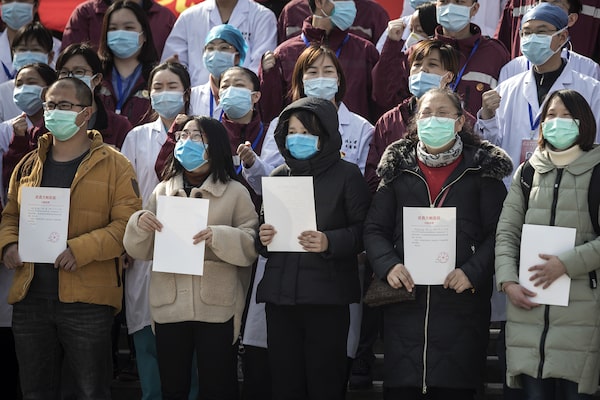Carl Gershman is the president of the National Endowment for Democracy in the United States and a senior fellow at the Raoul Wallenberg Centre for Human Rights.

Discharged COVID-19 patients and medical professionals pose for photos as they leave Wuchang Fang Cang makeshift hospital, which is the latest temporary hospital being shut down, on March 10, 2020 in Wuhan, Hubei province, China.Wang He/Getty Images
In his 1970 Nobel Lecture in literature, the famous Soviet dissident and writer Aleksandr Solzhenitsyn declared that the violence that is at the root of communist totalitarianism – the Stalinist labour camps and brutal violence that he experienced and chronicled in works like The Gulag Archipelago – is inherent to that system. “It is invariably intertwined with the lie,” he said. "They are linked in the most intimate, most organic and profound fashion: violence cannot conceal itself behind anything except lies, and lies have nothing to maintain them save violence. Anyone who has once proclaimed violence as his method must inexorably choose the lie as his principle.”
This truth is profoundly relevant today in understanding the way the communist regime in China has handled the spreading coronavirus epidemic.
Eight doctors in the city of Wuhan were punished in December for raising the alarm about the virus, including Li Wenliang, the 33-year-old ophthalmologist at the city’s central hospital who was forced to sign a statement apologizing for doing so, as it constituted “illegal behavior.” Mr. Li became a national hero, but then became a martyr as well, with his death on Feb. 7 triggering an outpouring of rage and grief online over the regime’s lying and concealment.
It wasn’t until Jan. 20, 40 days after the virus was first detected, that Chinese President Xi Jinping first issued instructions to control the virus, but by then it was too late, both because the virus had already become an epidemic, and because the government’s credibility with the Chinese public had suffered a devastating blow. A hashtag demanding an apology to Mr. Li was viewed 180 million times before it was blocked by the regime, and many in China are now comparing the epidemic to the Chernobyl disaster in the Soviet Union, which contributed heavily to the Soviet regime’s loss of legitimacy and its eventual downfall. China could be approaching a similar systemic crisis.
In an essay published earlier this month, Xu Zhangrun – a Tsinghua University law professor who was fired last year for dissent and has emerged as the most prominent democratic voice since Liu Xiaobo – charged that the epidemic has revealed “the rotten core” of the Chinese system. With the country ruled by “in-house Party hacks,” he said that day-to-day governance is in a state of "terminal decay”, and that “the rot goes right up to Beijing.” Mr. Xi, according to Mr. Xu, is “clueless,” and lacks any “substantive understanding of rulership and governance, despite his undeniable talent for playing power politics.” Reform is “dead in a ditch,” normal governance has been replaced by “systemic atrophy,” and because of its “aggressive international posture” and refusal to "become a modern political civilization”, China has become increasingly isolated from the modern global system. Mr. Xu believes that the only way China can end this isolation and regain the people’s trust is by embracing constitutional democracy.
This is now not inconceivable. "The people are no longer fearful,” Mr. Xu writes, and pro-democracy developments in Hong Kong and Taiwan may offer “a particular Chinese Way out of our present political conundrum.” Put another way, he says, “a breakthrough originating from the periphery may augur once more [as it did in the 1890s, the 1910s, the 1940s and again in the 1980s] a moment that favors a push towards meaningful constitutional and legal rule in China.”
The spread of the coronavirus has driven home to the entire world the costs of “the rise of a Goliath-like China no one trusts,” says Jimmy Lai, the founder and editor of the pro-democracy Apple Daily newspaper in Hong Kong who was just arrested for an article he published in The Wall Street Journal. In that article, he says that everyone “must start asking something that the Chinese people living under communism ask themselves every day: How reliable can China’s political, social and economic institutions be when its local government leaders lie to their citizens and superiors alike?” By showing that lying is at the heart of Chinese communism, and that there’s no cure for the system “except the collapse of the party,” Mr. Lai concludes that the coronavirus “may prove as revolutionary as any event in China’s history.”
As the world tries to contain the spread of the epidemic, it needs also to heed the message coming from Chinese democrats, which is that we all have a stake in China becoming a more open, democratic, and trustworthy political system. As Mr. Solzhenitsyn said in that same Nobel Lecture, “there are no internal affairs left on our crowded earth.” In defending the struggle for democracy and human rights in China, we safeguard our own future.
Keep your Opinions sharp and informed. Get the Opinion newsletter. Sign up today.